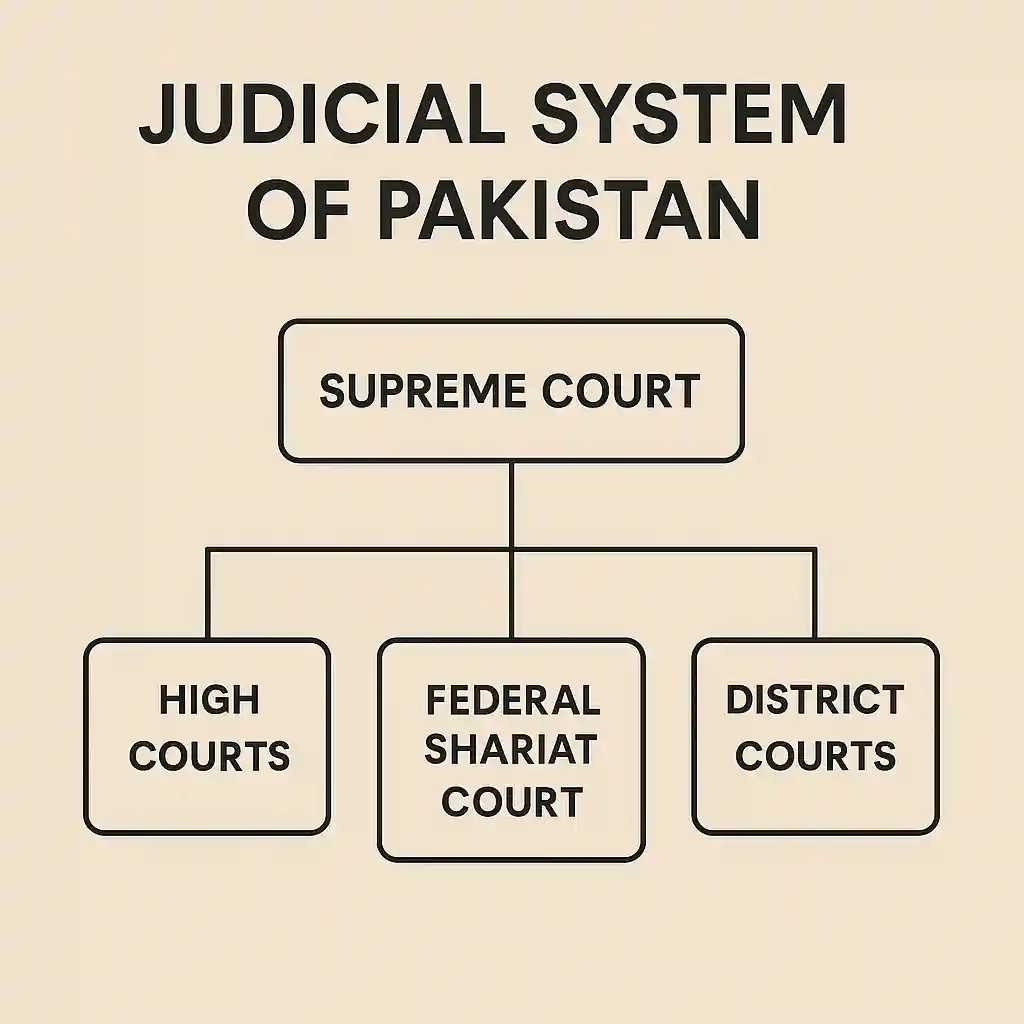Pakistan’s judiciary derives its authority from Part VII of the 1973 Constitution, which enshrines the principle of separation of powers. Articles 175 through 212 delineate the judiciary’s independence, vesting judicial power in the courts and establishing the Supreme Judicial Council to oversee judicial conduct.
This constitutional framework ensures that judges can adjudicate without undue influence, preserving the rule of law and public confidence in the justice system.
Judicial Hierarchy: An Overview
The Pakistani judiciary operates as a two‑tiered hierarchy. At the apex lies the Superior Judiciary, comprising the Supreme Court, the Federal Shariat Court, and five High Courts—one for each province and one for the Islamabad Capital Territory.

Beneath them, the Subordinate Judiciary handles the bulk of civil and criminal litigation through district and sessions courts, civil judges, magistrates, and various specialized tribunals.
Superior Courts
Supreme Court of Pakistan
As the ultimate appellate authority, the Supreme Court consists of the Chief Justice and up to 21 puisne judges, along with ad hoc and acting judges when required.
It exercises original jurisdiction in disputes between federating units, appellate jurisdiction over High Court decisions, and writ jurisdiction to enforce fundamental rights.
Federal Shariat Court
The Federal Shariat Court ensures that laws conform to Islamic injunctions. Headed by a Chief Justice and supported by Muslim judges drawn from the superior judiciary, it reviews legislation for Shariah compliance and hears appeals in Hudood cases, thereby integrating Islamic jurisprudence within Pakistan’s legal framework.
High Courts
Each province and the Islamabad Capital Territory hosts a High Court, led by a Chief Justice and a bench of puisne and additional judges.
High Courts possess original jurisdiction in constitutional matters, appellate jurisdiction over district courts, and power to issue writs, making them critical guardians of fundamental rights at the provincial level.
Subordinate Courts
District and Sessions Courts
At the district level, Sessions Courts handle serious criminal cases, while Civil Courts resolve civil disputes. The Sessions Judge presides over criminal trials, with Additional Sessions Judges assisting.
These courts form the backbone of the criminal justice system, applying procedural laws such as the Criminal Procedure Code.
Civil Judges and Magistrates
Civil Judges and Judicial Magistrates adjudicate lower‑value civil and minor criminal cases. They ensure accessible justice for everyday disputes, from property disagreements to petty offenses, reflecting the judiciary’s reach into local communities.
Specialized Tribunals
Beyond mainstream courts, specialized tribunals such as labour courts, banking tribunals, and anti‑terrorism courts address niche areas of law, expediting resolution of technical or sensitive matters under expert judges.
Types of Judges in Pakistan
Judges in Pakistan fall into several categories. The Chief Justice heads each superior court, followed by puisne judges, who hold permanent seats.
Additional judges are appointed on a provisional basis to manage caseloads, while acting and ad hoc judges fill temporary vacancies.
In the subordinate judiciary, Sessions Judges, Civil Judges, and Judicial Magistrates preside over their respective courts, each exercising powers defined by statute.
Get more information:
How to Be a Session Court Judge in Pakistan
Appointment, Tenure, and Retirement
Appointments to the superior judiciary are conducted through a two‑stage process: nomination by the Judicial Commission chaired by the Chief Justice and including senior judges, the Attorney General, law ministers, and bar representatives and confirmation by a Parliamentary Committee.
Judges serve until retirement 65 for the Supreme Court and 62 for High Courts unless removed for misconduct by the Supreme Judicial Council.
Jurisdiction and Powers
Courts exercise various jurisdictions. The Supreme Court and High Courts issue original rulings in constitutional disputes, appellate judgments on lower court appeals, writs to enforce rights, and advisory opinions on presidential references.
Contempt powers empower them to uphold the dignity of the bench and the administration of justice.
Judicial Independence and Accountability
The Supreme Judicial Council, comprising senior judges, investigates allegations of misconduct and can recommend removal of judges to the President.
Recent constitutional amendments have refined appointment procedures, sparking debate over the balance between judicial independence and democratic oversight. These reforms underscore the dynamic interplay between law and politics in Pakistan.
Read more about:
- What is the Supreme Court of Pakistan
- What is the High Court in Pakistan
- What are the District Courts & Session Courts in Pakistan
- What are the Special Courts in Pakistan
- What are the Banking Courts in Pakistan
FAQs:
Q: What is the highest court in Pakistan?
The Supreme Court of Pakistan is the highest judicial authority, with final appellate jurisdiction and power to interpret the Constitution.
Q: How are Supreme Court judges appointed?
Judges are nominated by the Judicial Commission and confirmed by a Parliamentary Committee, ensuring both judicial and legislative oversight.
Q: What is the Federal Shariat Court and what cases does it hear?
It reviews laws for compliance with Islamic injunctions and hears appeals in Hudood cases, integrating Shariah principles into Pakistan’s legal system.
Q: What is the difference between civil and criminal courts?
Civil courts resolve disputes between private parties (e.g., property, contracts), while criminal courts adjudicate offenses against the state under the Criminal Procedure Code.
Q: What types of judges serve in district courts?
District courts are presided over by Sessions Judges for criminal matters and Civil Judges for civil disputes, with Judicial Magistrates handling minor offenses.
Q: At what age do judges retire in Pakistan?
Supreme Court judges retire at 65, High Court judges at 62, and subordinate court judges typically at 60, depending on provincial rules.
Q: How does the Judicial Commission ensure transparency in appointments?
By including senior judges, government law officers, and bar council representatives, the Commission balances judicial expertise with broader stakeholder input.
